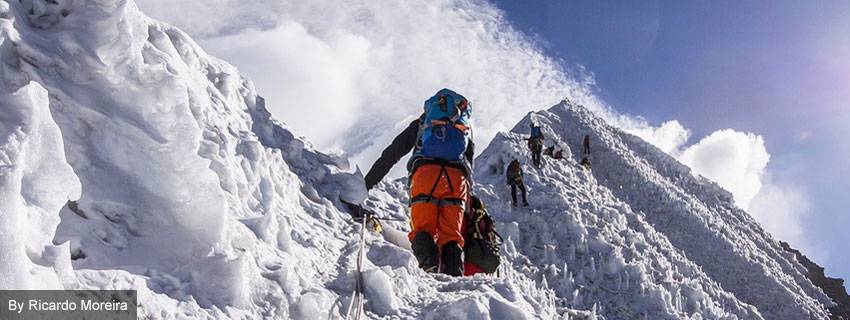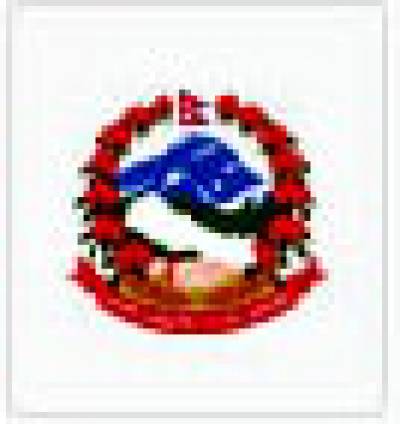19 DAYS EVEREST BASE CAMP WITH ISLAND PEAK CLIMBING
Are you ready to meet the challenge and climb your first mountain in the company of an experienced guide? Go beyond your comfort zone – the rewards will remain with you long after you leave Nepal. The adrenalin rush is beyond words.
This 19 Day Everest Base Camp Trek (5364m), with Island Peak (6189m) climbing, will satisfy that urge to go push yourself and to cross this off your “bucket list”. With time to acclimatize and with some pre-climbing training at Island Peak Base Camp, you will be prepared and eager to get to the summit. This is a combination of trekking and climbing in one well-designed package. Imja Tse is Tibetan for Island Peak. Island Peak got its name for it looked like a sea of ice too early mountaineers. This is a great trek for those who have never climbed a mountain and worked as a team to make the summit.
Sherpa Expedition and Trekking takes you into the heart of the Himalayas in the Everest region. The Everest Base Camp (EBC) trek with the ascent of Island Peak begins with a scenic birds-eye view over the soaring white Himalayan Mountains. You will land at Lukla then hit the trail and trek up the Dudh Kosi Valley surrounded by the massive Thamserku (6623m) and Kusum Kanguru (6367m). Kusum Kanguru, means "Three Snow-White Gods" in the Sherpa language, which refers to the triple summit of the mountain. Island Peak is also known in Tibetan as Imja Tse. Island Peak was aptly named by earlier Mt.Everest explorers due to it appearing as an island in a sea of ice.
We will take you to several excellent vantage points from where you can see Mt.Everest, such as Kala Patthar (meaning 'black rock' in Nepali). The trek begins at Namche Bazaar and along the trail takes you to the famous Tengboche Monastery (3860m) where you can get a feel for the Buddhist Tibetan culture. A more physically demanding day will see you over and through Kongma La Pass (5535m). Trekking at these altitudes will take you to Island Peak Base Camp (5200m), Everest Base Camp (5364 m) and of course Island Peak – the feather in your cap at 6189 meters!
Sherpa Expedition & Trekking have more than 40 years of experience making people’s dreams come true. We continue to improve and ensure you are well taken care of and safe.
Key Features of 19 Days Everest Base Camp with Island Peak Climbing
- Climb Island Peak at an elevation of 6189m, Real mountain climbing experience.
- Amazing views from the summit of Island Peak.
- Climbing Kalapathar's amazing viewpoint of Mt. Everest. Trek to the base of the world’s highest peak Mt. Everest at (5364m).
- Head through the high altitude Kongma la Pass (5535m).
- Exploring Sherpa's traditional villages enriched with Buddhist culture and customs.
- Visit historical sites and interesting monasteries at the base of some of the world's most spectacular peaks, beautiful alpine rhododendrons, pine forests and the barren Khumbu Glaciers.
- Experience panoramic views of enormous mountains while spending your nights in the warmth and comfort of clean scenic lodges - and of course the feeling of the warm Sherpa hospitality.
ITINERARY
Day 1 : Arrival at Kathmandu and transfer to hotel (1350m)
Welcome to Kathmandu, a city full of vibrant markets, bustling streets, colorful temples, and grand pagodas. Our guide will meet you at the airport and take you to our hotel. The remainder of the day you will have an opportunity to familiarize yourself with the shopping areas closest to your hotel and catch up on shopping for equipment. In the evening, our tour guide will give you a brief introduction and provide valuable information about the trek.
Day 2 : Fly from Kathmandu to Lukla (2804m) & trek to Phakding (2610m) Duration: 4-5 hours.
After an early morning start, you will be picked up at the hotel by our guide who will take you to the domestic terminal of Kathmandu airport. The flight from Kathmandu to Lukla takes around 35 minutes, time enough to take in the spectacular views of the Himalayas. After landing at Tenzing-Hilary airport you will meet your porter who will carry your luggage. You then begin your journey with a relatively easy trek passing a Kani (ceremonial gatehouse) before the trail descends then leads above Kyangma village with its large Gompa (monastery) and school. We then continue to Cheplung village where the trail passes through community forest within sight of the Dudh Koshi River. After crossing the suspension bridge you climb across the ridge to Ghat and then pass a school and complex of Mani walls, Chortens, and prayer wheels. After a short walk from Ghat, we reach Phakding situated close to the Dudh Kosi River.
Day 3 : Trek from Phakding to Namche Bazaar (3440m) Duration: 5-6 hours.
After breakfast, the trek crosses several suspension bridges over the Dudh Kosi River before passing through Tok-Tok, Bhenkar, and Monjo and then arriving at Sagarmatha National Park entrance gate where you will be required to buy a permit. After following the river bed for a few hours and after the last Hillary suspension bridge, there is a steep uphill trek to Namche Bazaar. Namche has a good selection of restaurants, cyber café, pubs, post office, ATM, and banks. Breakfast, lunch & dinner included.
Day 4 : Acclimatization at Namche Bazaar (3440m)
This idyllic town is an ideal place for acclimatization. Health specialists recommend we spend the day being active, rather than sitting idle. From Namche, it is possible to take a short hike to Everest View Resort, Thame, visiting Khunde or relax and explore Namche Bazaar. Namche Bazaar is the main center of the Everest (Khumbu) region and has government offices, ATMs, internet cafes, shops, restaurants, bakery, and a colorful market each Friday evening and Saturday. A short trek of only a hundred meters will help us to properly acclimatize. Our guides will also take us to the Tourist Visitor Center near the headquarters of the Sagarmatha National Park where we can observe an assortment of relics related to the first mountaineers to climb Everest, Sherpa culture and discover the varied plant and animal life of the Everest region. Breakfast, lunch & dinner included.
Day 5 : Trek from Namche Bazaar to Tengboche Monastery (3870m) Duration: 5-6 hours.
The trek continues along the rapid flowing glacial waters of the Dudh Kosi with magnificent views of the mountains (Mt. Everest, Lhotse, Taboche peak, Amadablam. You eventually reach an altitude of 3,800 meters at Tengboche. At the Tengboche monastery are unbelievably ornate wall hangings, a 20-foot sculpture of various poses of the Buddha and musical instruments and robes of the Lamas. Our group will be taken to observe a prayer ceremony, either in the evening or in the morning, depending on how the trekking goes this day. Breakfast, lunch & dinner included.
Day 6 : Trek from Tengboche to Dingboche (4460m) Duration: 4-5 hours.
The trek from Tengboche to Dingboche is only a short distance of around four to five hours, which we will most likely complete in the afternoon. The last hill into Dingboche, and at this high altitude, is challenging! The trail then heads to the village of Somare (4020m) and then to Orsho, both of which have lodged. Later the trail divides, with the left trail heading up to Pheriche before crossing a suspension bridge and a steep climb to the village of Dingboche with many good guesthouses. Breakfast, lunch & dinner included.
Day 7 : Acclimatization at Dingboche & trek to Nangkartshang Peak (5083m) Duration: 4-5 hours.
Health specialists recommend we spend the day being active, rather than sitting idle. To this end, we will trek for three to four hours to Nangkartshang Peak just above Dingboche with excellent views over the surrounding mountains, especially Ama Dablam (6812m). Breakfast, lunch & dinner included.
Day 8 : Trek from Dingboche to Lobuche (4900m) Duration: 5-6 hours.
After breakfast, our trek starts with an easy walk towards Thukla before crossing the steep terminal moraine of the Khumbu Glacier, and then passing through the boulder-strewn slopes as we ascend Chupki Lhara where we find clusters of stones with prayer flags placed by Sherpas as a memorial to Scott Fischer (American mountaineer) and 10-time Everest climber Babu Chiri Sherpa (Nepalese Sherpa mountain guide) who perished on a mission to climb Mt. Everest. The path then continues to the Khumbu Glacier moraine and before us are many beautiful mountain peaks - Khumbutse, Lingtren, and Mahalangur Himal. We stay overnight in Lobuche.
Day 9 : Trek from Lobuche to Gorakshep & trek to EBC (5364m) & return to Gorakshep (5180m) Duration: 7-8 hours.
We commence our six to seven-hour trek to Mt. Everest Base Camp through the vast Gorak-Shep. Along the trail, we pass the Indian army mountaineers' memorials. At this point the path can be confusing, so following your guide is important. The thin air at this high altitude can be exhausting. We traverse rocky dunes, moraine, and streams before reaching the Mt. Everest Base Camp. From Everest Base Camp you will see some of the world’s highest peaks, in stark contrast to the gray surroundings - especially in the spring. Before we are Khumbutse, Nuptse, and Pumori. We will then head back to Gorakshep for a well earned night’s rest in Lobuche. Breakfast, lunch & dinner included.
Day 10 : Trek from Gorakshep to Kalapathar (5550m) at sunrise & back to Lobuche (4940m) Duration: 7-8 hours.
At around 4 a.m. in pre-dawn darkness and cold temperatures (-10 to -14 C) we begin our trek. It is common for there to be cold winds at this altitude. Towering peaks, such as Khumbutse, Lingtren, and Changtse loom before us to the east as Everest comes into view. Not until we reach Kala Patthar (5550m) do we get a 360 degree up-close and bird’s eye view of Mount Everest. After taking in the panoramic views and madly clicking cameras we will return back to Lobuche for a good night's rest. Breakfast, lunch & dinner included.
Day 11 : Trek from Lobuche to Kongma La Pass (5535m) to Chhukung (4730m) Duration: 8-9 hours.
An early start sees us trekking for six to seven hours via the Khumbu Glacier to Kongma La Base Camp (5000m). This is the most difficult day of our trek. In the pass there are prayer flags that show the route. We then slowly descend to Imja Khola Valley and then down to the small village of Chhukung where we will go over our equipment before our ascent of Island Peak. Tonight we will stay at Chhukung. Breakfast, lunch & dinner included.
Day 12 : Trek from Chhukung to Island Peak Base Camp (5200m) Duration: 4-5 hours.
We have a three to four-hour steep ascent to Island Peak Base Camp, crossing the moraine below Lhotse Glacier and then follow a small river. We cross over the Imja and Lhotse glacier moraines until we come out at a wide valley in the south-west of Island Peak. Tonight we stay at Island Peak Base Camp. Breakfast, lunch & dinner included.
Day 13 : Pre-climb training at Island Peak Base Camp (5200m)
Today your guides will instruct you on various climbing techniques and use of an ice ax, climbing boot crampons, harnesses, ascenders, and other equipment. Your guide will show you how to use the ropes during the ascent and descent. This training is not too technical but is necessary to ensure your safety and wellbeing. After some basic training, you will feel more confident and capable of getting to the summit. In order to help you further acclimatize to this altitude, we may trek to High Camp. The rest of the day we can rest and prepare for tomorrow’s climb. We will stay overnight at the base camp. Breakfast, lunch & dinner included.
Day 14 : Summit Island Peak (6189m) & return to Base Camp; Duration: 8-9 hours.
This is the day you have been waiting for and we have to wake up around midnight to 1 am to complete 10 to 12 hours climbing. The goal is to reach the summit before lunchtime for there is a likelihood of strong winds in the afternoon. Initially, we head up beyond Base Camp along a steep hillside and then come to a point where we cross boulders and the slope becomes narrower. The trail then crosses a rather steep gully and from here we follow the ridgeline to the base of the glacier that reaches all the way to the summit. A sharp incline on a snowy slope takes us to the summit. Your guides will very likely attach ropes at this point – fixed and person to person. The rope will stretch to about 350 meters depending on the depth of snow and if there are any crevices. In past climbs, there have been several crevices where in order to cross them we have used ladders. Once at the summit we can sit back and soak up some of the most mind-boggling views you will ever see. This is truly an exhilarating moment and time to snap photos. We will then descend back to Island Peak Base Camp where we can celebrate on our successful climb of Island Peak. Breakfast, lunch & dinner included.
Day 15 : Trek from Base Camp to Tengboche Monastery (3860m) Duration: 6-7 hours.
After yesterday’s adventure, we follow the trail back to Tengboche where we will stay the night, and once again you can take in the tranquility of the Tengboche Monastery.
Day 16 : Trek from Tengboche to Namche Bazaar (3440m) Duration: 5-6 hours.
We continue our trek today down and across the hillside blanketed by colorful rhododendron and juniper trees. After crossing the bridge over the Dudh Koshi River (milky river in Nepali) our trail continues through the Dudh Koshi gorge descending rapidly through the pine forests before reaching Sansa. Along the way we keep our eyes peeled for wildlife, such as (Himalaya Thar) mountain goats, snow leopards, and colorful pheasants while passing through the forest. After passing a Chorten we reach the army camp at Namche Bazaar where we stay overnight. Breakfast, lunch & dinner included.
Day 17 : Trek from Namche Bazaar to Lukla (2804m) Duration: 6-7 hours.
This is our final day of trekking before returning to our starting point at Lukla. This is a time to reflect on the unforgettable memories of our trek as a group and our achieving our individual goals. A free afternoon allows you time to relax and enjoy a hot shower! In the evening we will celebrate with a few drinks and dance. Breakfast, lunch & dinner included.
Day 18 : Fly from Lukla back to Kathmandu (1350m) Duration: 30 minutes flight.
After our 18 day trek, we take an early morning flight from Lukla to Kathmandu. After arriving at Kathmandu, you can take a rest or do some shopping. This is also a time to catch up on visiting places you missed on arrival in Kathmandu. Our guides will continue to assist you with b souvenir shopping or sightseeing.
Day 19 : Transfer to Tribhuvan International Airport.
Your adventure comes to an end today – but your memories will last a lifetime! Our company representative will take you to the airport approximately 3 hours before your scheduled flight. On your way home you'll have plenty of time to plan your nearest next adventure and explore the most magnificent mountains of Nepal.
SERVICES
Costs included in your package.
- Airport picks up and transports by private Car/Jeep.
- Two night’s standard twin sharing Hotel in Kathmandu with breakfast.
- Three meals a day (Breakfast, lunch, and dinner) during the trek.
- Fresh fruit every evening after dinner.
- Trekking Lodge (Tea House) during the trek and tent camp accommodation during climbing session.
- All necessary paperwork including Sagarmatha National Park Entry Permit & Khumbu Pasang Lhamu Rural Municipality fees.
- Kathmandu-Lukla-Kathmandu (Ramechhap -Lukla- Ramechhap) flight with private airport transfer and domestic airport tax.
- A highly experienced, helpful, knowledgeable, friendly, English speaking well trained, Government license holder guide with all his salary, food, drinks, accommodation, transport and insurance.
- Climbing permit of Island Peak.
- Strong, helpful Sherpa porters with proper safety equipment and walking equipment, his salary, food, accommodation, and insurance (one porter for two people).
- Comprehensive medical supplies (first aid kit will be available).
- Arrangement of emergency helicopter service (paid by your Travel Insurance Company).
- Use of sleeping bag, down jacket, duffel bag and walking poles (if you don’t have your own, to be returned after trip completed).
- Sherpa Expedition and Trekking T-shirt
- Government taxes and official expenses.
- Trip achievement certificate after successful trip completion.
- Oxygen meter to check your pulse and oxygen saturation and heart rate twice daily (Very useful to check Altitude Mountain Sickness(AMS) symptoms) which will ensure your health during the trek.
- Assistant guide for groups of 8 or more people.
Costs Exclude
- Meals whilst you are in Kathmandu - lunch, and dinner.
- Nepal entry visa fee (easy to obtain the visa on arrival at Tribhuvan International Airport – Kathmandu). $30 USD for 15-day, $50 USD for 30 Days, and $125 USD for 90 Days visa.
- Personal travel and medical insurance.
- International airfare.
- Your personal expenses.
- All the alcoholic and nonalcoholic, soup, tea, coffee, hot chocolate, cocoa, mineral water, extra food, cold and hot drinks on trek ( i.e. those you choose to purchase along the way and during evenings in the tea houses)
- All desserts & sweet things like chocolate, cake, pie, pudding.
- Hot shower and battery charging at the tea houses.
- Tips for the guide, porter, and driver (tipping is expected)
- Excess baggage of more than 10 kg for Lukla flight.
- NOTE: If you return earlier from the trek due to sickness or any problem, the money you paid for the flight, hotel, mountain room, food, etc. is nonrefundable, and you will need to bear the expenses for the hotel, food, etc. in Kathmandu yourself.
EQUIPMENTS
You will be carrying all of your gear and share some of the cluster gear. Keeping your pack light is important, so choose light-weight clothing and equipment. Be sure to have a range of clothing suitable for all conditions. Sudden change of weather may require layering of clothing. Three layers will meet your needs. Avoid cotton or fabrics that do not maintain heat when cold. Comfortable durable wool (or proven fabrics) that breathe and expel sweat lends itself to an additional pleasant experience!'
We will offer complimentary water and a windproof duffle that you'll use on the trek - carried by porters. The duffle is yours to keep once at the end of the trek. You can safely leave your bag, together with your non-trekking requirements, at our office in Katmandu and collect them upon your return.
All equipment, such as base camp tents, room accessories, climbing rope, ice screws, snow bar and ice hammer is provided by Sherpa Expedition & Trekking.
Upper Body:
- Base Layers: Moisture-wicking and quick-drying shirts and thermal tops.
- Insulation Layers: Fleece or down jackets to provide warmth.
- Waterproof Shell Jacket: A durable and breathable jacket to protect against wind and rain.
- Softshell Jacket: A lightweight and water-resistant jacket for added protection.
- Climbing Harness: A comfortable harness to secure yourself to the rope.
- Helmet: A strong and well-fitting helmet to protect your head from falling objects.
- Gloves: A combination of lightweight liner gloves and insulated gloves or mittens for warmth and dexterity.
- Buff or Neck Gaiter: To protect your neck and face from cold and wind.
- Sunglasses: Polarized and UV-protected sunglasses to shield your eyes from the sun and snow glare.
- Goggles: Ski or mountaineering goggles for added eye protection in extreme weather conditions.
Lower Body:
- Base Layers: Moisture-wicking and quick-drying thermal bottoms.
- Insulation Layers: Fleece or insulated pants for added warmth.
- Waterproof Shell Pants: Durable and breathable pants to protect against wind, rain, and snow.
- Softshell Pants: Lightweight and water-resistant pants for added protection.
- Mountaineering Boots: Sturdy and insulated boots designed for snow and ice.
- Crampons: Attachable spikes that provide traction on icy terrain.
- Gaiters: Waterproof and breathable gaiters to keep snow out of your boots.
- Socks: A combination of moisture-wicking liner socks and thick, warm mountaineering socks.
Other Essential Items:
- Backpack: A spacious and sturdy backpack to carry your climbing gear and personal belongings.
- Sleeping Bag: A warm and lightweight sleeping bag that can withstand sub-zero temperatures.
- Trekking Poles: Adjustable trekking poles for added stability and support.
- Headlamp: Essential for climbing in low-light or dark conditions.
- Water Bottles: Insulated water bottles to keep your water from freezing.
- Sunscreen: High SPF sunscreen to protect your skin from the strong sun at high altitudes.
- First Aid Kit: A comprehensive first aid kit with essential medications and supplies.
- Climbing Snacks: Energy bars, nuts, and other lightweight snacks for quick fuel during the climb.
It is important to invest in high-quality gear and ensure that everything fits properly and is in good condition. Additionally, consult with experienced climbers or a professional guide to ensure you have all the necessary gear and receive proper training on how to use it effectively and safely.
GOOD TO KNOW
If you are considering climbing Island Peak, here are some important things to know:
1. Island Peak, also known as Imja Tse, is located in the Everest region of Nepal. It stands at an elevation of 6,189 meters (20,305 feet) and is a popular climbing destination for mountaineers.
2. Prior climbing experience is recommended as Island Peak is a technical climb. Basic mountaineering skills such as using crampons, ice axe, and rope techniques are necessary.
3. Acclimatization is crucial due to the high altitude. It is advisable to spend a few days in the Everest region, acclimatizing and trekking to higher altitudes before attempting the climb.
4. A climbing permit is required to climb Island Peak. This can be obtained through a registered trekking agency in Nepal. Make sure to check the latest permit regulations and fees.
5. Hiring a local guide or joining a guided expedition is highly recommended. They have the expertise, knowledge of the route, and can provide support and safety during the climb.
6. The best time to climb Island Peak is during the pre-monsoon (spring) season (April to May) and post-monsoon (autumn) season (September to November). These months generally have more stable weather conditions and clear views.
7. Proper gear and equipment are essential for a safe and successful climb. This includes mountaineering boots, crampons, ice axe, climbing harness, helmet, layers of warm clothing, gloves, and other necessary climbing gear.
8. Physical fitness and endurance are important for climbing Island Peak. Regular exercise, cardiovascular training, and strength-building activities are recommended to prepare your body for the physical demands of the climb.
9. It is important to be aware of altitude sickness and its symptoms. Take necessary precautions, such as proper acclimatization, staying hydrated, and following the guidance of your guide.
10. Respect the local culture and environment. Island Peak is located in Sagarmatha National Park, a UNESCO World Heritage Site. Follow the Leave No Trace principles, adhere to local customs, and be mindful of the fragile mountain ecosystem.
Always prioritize safety and consult with experienced climbers or professional guides for further information and guidance specific to your Island Peak climbing expedition.
MAP
PHOTOS/Videos
Departures
Select a departure month
Fill out the form below and a Travel Expert will reach out to create your perfect tour.
FAQS
How difficult is it to climb Island Peak?
Island Peak is considered a moderately difficult climb. It requires basic mountaineering skills, including using crampons, ice axe, and rope techniques. Prior climbing experience and physical fitness are recommended.
Do I need a climbing permit for Island Peak?
Yes, a climbing permit is required to climb Island Peak. It can be obtained through a registered trekking agency in Nepal. The permit fees vary depending on the season and nationality.
Can I climb Island Peak without a guide?
While it is possible to climb Island Peak without a guide, it is highly recommended to hire a local guide or join a guided expedition. They have the knowledge, experience, and can ensure your safety during the climb.
What is the best time to climb Island Peak?
The best time to climb Island Peak is during the pre-monsoon (spring) season (April to May) and post-monsoon (autumn) season (September to November). These months generally have more stable weather conditions and clear views.
How long does it take to climb Island Peak?
The duration of the climb can vary depending on several factors, including your fitness level and acclimatization. Typically, it takes around 3 weeks for a complete Island Peak climbing expedition, including trekking to and from the base camp.
What permits do I need for climbing Island Peak?
In addition to the climbing permit, you also need a Sagarmatha National Park entry permit and a TIMS (Trekkers' Information Management System) card. These permits can be obtained through the trekking agency.
Is altitude sickness a concern on Island Peak?
Yes, altitude sickness is a concern when climbing Island Peak due to the high elevation. Proper acclimatization, staying hydrated, and following the guidance of your guide are essential to minimize the risk.
What gear do I need for climbing Island Peak?
You will need mountaineering boots, crampons, ice axe, climbing harness, helmet, layers of warm clothing, gloves, and other necessary climbing gear. It is important to have proper gear and equipment for a safe and successful climb.
Is previous climbing experience required for Island Peak?
While previous climbing experience is not mandatory, it is highly recommended to have some basic mountaineering skills and experience with high-altitude trekking to ensure a safer and more enjoyable climb.
Can I rent climbing gear in Nepal?
Yes, you can rent climbing gear in Nepal. Kathmandu and Lukla are common places to find gear rental shops. However, it is advisable to bring your own personal gear and rent only the equipment you don't have or can't bring with you.
Latest Traveller’s Reviews
Travel experiences of our clients who recently returned from their trips.
100%
Based On 9 Reviews
Nayla Jones
United States
December 12, 2023
A journey of self-discovery
The Everest Base Camp trek with Island Peak Climbing is not just about reaching the summit. It's a journey of self-discovery, pushing your limits, and finding strength within yourself. This adventure will challenge you, inspire you, and leave you with a sense of accomplishment like no other.
Valentina Dziuba
United Kingdom
November 8, 2023
A life-changing adventure
Embarking on the Everest Base Camp trek with Island Peak Climbing was a life-changing adventure. The physical and mental challenges, the stunning landscapes, and the sense of accomplishment upon reaching the summit of Island Peak have left an indelible mark on me.
Xavier Robles
Australia
November 2, 2023
Authentic cultural experiences
The Everest Base Camp trek with Island Peak Climbing not only offers breathtaking natural beauty but also authentic cultural experiences. Interacting with the Sherpa people, visiting monasteries, and immersing myself in the local way of life added a unique dimension to the journey.
People Considering This Package Right Now Check availability
























